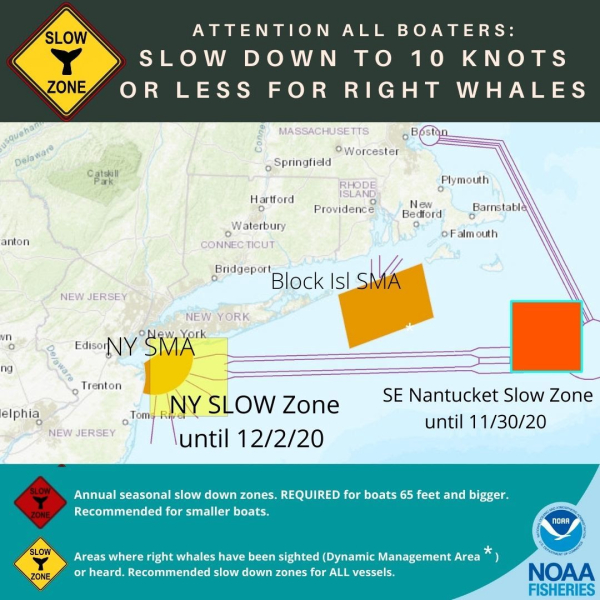Vessel Slow Zone to Protect Right Whales
 |
In Effect Through December 2
NOAA Fisheries is triggering a Slow Zone (voluntary vessel speed restriction zone), southeast of New York City.
This Slow Zone was triggered on November 17, 2020, when the Woods Hole Oceanographic Institute acoustic monitoring buoy detected right whales in the New York Bight, New York.
Mariners, please go around this areas or go slow (10 knots or less) inside this area where right whales have been detected.
Southeast of New York City Slow Zone is in effect through December 2.
40 41 N
40 01 N
073 03 W
073 55 W
Active Seasonal Management Areas November 1- April 30Mandatory speed restrictions of 10 knots or less (50 CFR 224.105) are in effect in the following areas: Block Island Sound Ports of New York/New Jersey Entrance to the Delaware Bay Entrance to the Chesapeake Bay Ports of Morehead City and Beaufort, NC Within a continuous area 20-nm from shore between Wilmington, North Carolina, to Brunswick, Georgia. Find out more and get the coordinates for each mandatory slow speed zone. Give Right Whales RoomNorth Atlantic right whales are on the move along the Atlantic coast of the U.S. NOAA is cautioning boaters and fishermen to give these endangered whales plenty of room. We are also asking all fishermen to be vigilant when maneuvering to avoid accidental collisions with whales and remove unused gear from the ocean to help avoid entanglements. Commercial fishermen should use vertical lines with required markings, weak links, and breaking strengths. Right Whales in TroubleNorth Atlantic right whales are protected under the U.S. Endangered Species Act and the Marine Mammal Protection Act. Scientists estimate there are only about 400 remaining, making them one of the rarest marine mammals in the world. North Atlantic right whales are NOAA Fisheries' newest Species in the Spotlight. This initiative is a concerted, agency-wide effort to spotlight and save marine species that are among the most at risk of extinction in the near future. In August 2017, NOAA Fisheries declared the increase in right whale mortalities an “Unusual Mortality Event,” which helps the agency direct additional scientific and financial resources to investigating, understanding, and reducing the mortalities in partnership with the Marine Mammal Stranding Network, Canada’s Department of Fisheries and Oceans, and outside experts from the scientific research community. More InformationFind out more about our right whale conservation efforts and the researchers behind those efforts. Download the Whale Alert app for iPad and iPhone Acoustic detections in Cape Cod Bay and the Boston TSS, as well as other regions along the eastern seaboard. Details and graphics of all vessel strike management zones currently in effect. Reminder: Approaching a right whale closer than 500 yards is a violation of federal and state law. Spread the Word!All boaters, or interested parties, can sign up for email notifications and selecting "Right Whale Slow Zones" under the Regional New England/Mid-Atlantic subscription topics. You can also follow us on Facebook (@NOAAFisheriesNEMA) and Twitter (@NOAAFish_GARFO) for announcements. Watch our video on Right Whale Slow Zones. Recent Feature Stories about Right Whales |


 Advertising
Advertising